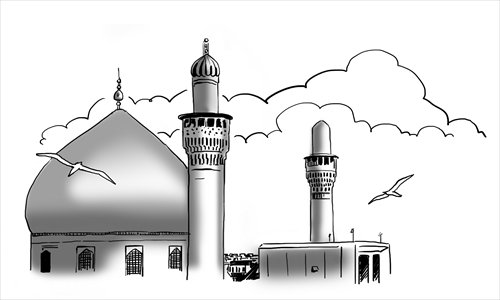Extremism makes tenuous new move into Central Asia

In September 2012, the Islamic world's anger over a notorious film produced by a Coptic group in the US, The Innocence of Muslims, denigrating Islam's prophet Muhammad stirred great anger. Central Asian countries like Kazakhstan, Kyrgyzstan, and Tajikistan jointed the anti-American protests.
Those Central Asian countries condemned that controversial movie. Their critiques remind the world that Islamic faith remains a crucial cultural characteristic in the region. Central Asia not only cultivates moderate Islam, but also breeds religious extremism, fundamentalism and even Islamic terrorism.
Central Asia connects the Islamic Middle East region, Russia, under the auspices of the Orthodox Church, and China with a pluralistic tradition and government-sanctioned religious bodies. This special geographical position means Central Asian countries have to face collisions and struggles between diverse religious forces. After the September 11 attacks, Central Asia became regarded as a crucial shield to resist the spread of religious terrorism.
The current spread of Islam in Central Asia, especially the alarming rise of Islamic fundamentalism in recent years will probably result in a spillover effect to neighboring countries. This might support regional Islamist forces in both spiritual and material ways, especially when religious extremist forces are in league with separatist forces. Some pessimists even consider the spread of Islam the main threat to the relatively peace situation in Central Asia.
But this is not that threatening a situation. After the collapse of the Soviet Union and revolutions of Eastern Europe, religion replaced political ideology and was associated with an Islamic resurgence. Islam has gradually returned to Central Asian countries' social life. Although Islam's history in Central Asia is over a thousand year old, its influence is still mainly confined to spiritual matters.
Most mosque-centered gatherings in Central Asian countries are about worship, learning doctrine, celebrating religious festivals and so forth. Mosques have not become political propaganda bases with Islamic overtones. The proportion of Islamic believers is large, but the percentage of those who identify as Islamic fundamentalists is very small.
Islamic groups have not established enough legitimate and powerful religious parties to participate in domestic politics, let alone further affect regional politics. Tajikistan is generally considered to have the most active political form of Islam among the Central Asian countries. Even so, Tajikistan's Islamic Renaissance Party, which is the only legal Islamist party in Central Asia, won two seats out of 63 seats in Tajikistan's 2010 parliamentary elections. Uzbekistan's law directly prohibits any establishment of religious parties. Compared with the secular political forces, Central Asian Islamic groups' political mobilization capacities are relatively weak.
Failed states tend to breed extremism, but Central Asian governments are functioning states with the power to control Islamist organizations. Their militaries have not been influenced by Islamist positions either.
In Central Asia, Sharia (Islamic law) is not applicable to most ordinary people, especially non-Muslims. The constitutions of Central Asian countries guarantee separation of church and state. Current secular laws in Central Asia are still able to adhere to universal modern religious principles, such as "separation of church and state," "freedom of belief" and "religious equality." Islamic law does not take precedence over secular laws.
In the climate of Islamophobia following the September 11 attack, a few Western pundits raised ridiculous, fear-mongering concerns of an Islamic "caliphate" in Europe. No serious scholar of either geopolitics or religion has adopted this position. But similar paranoid fears have been expressed about Central Asia.
We are reluctant to see an alternative extreme Islamic theocratic state, let alone a theocratic empire. But it would take a vividly fearful imagination to believe that religion could overcome the state and ethnic divisions of Central Asia, especially given the level of religious tolerance in the region, despite expressions of extremism.
The author is assistant professor of the Political Science Institute at the East China University of Political Science and Law. opinion@globaltimes.com.cn